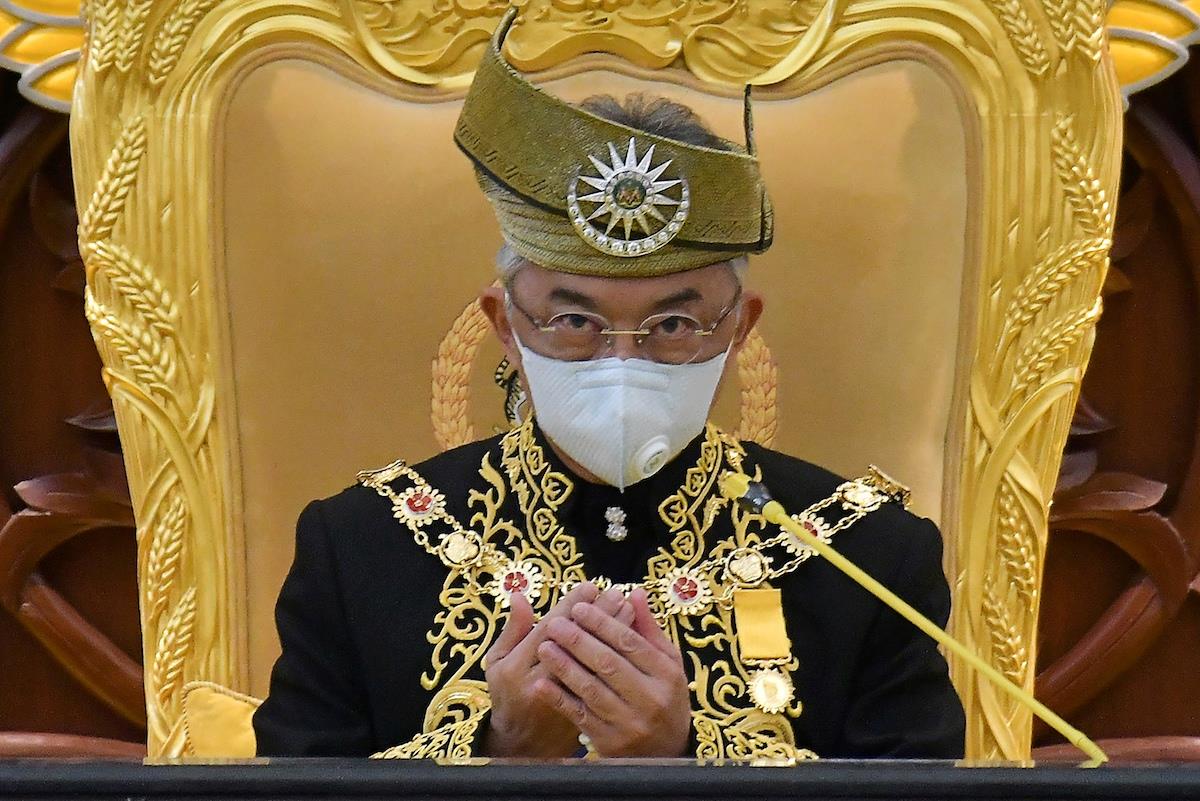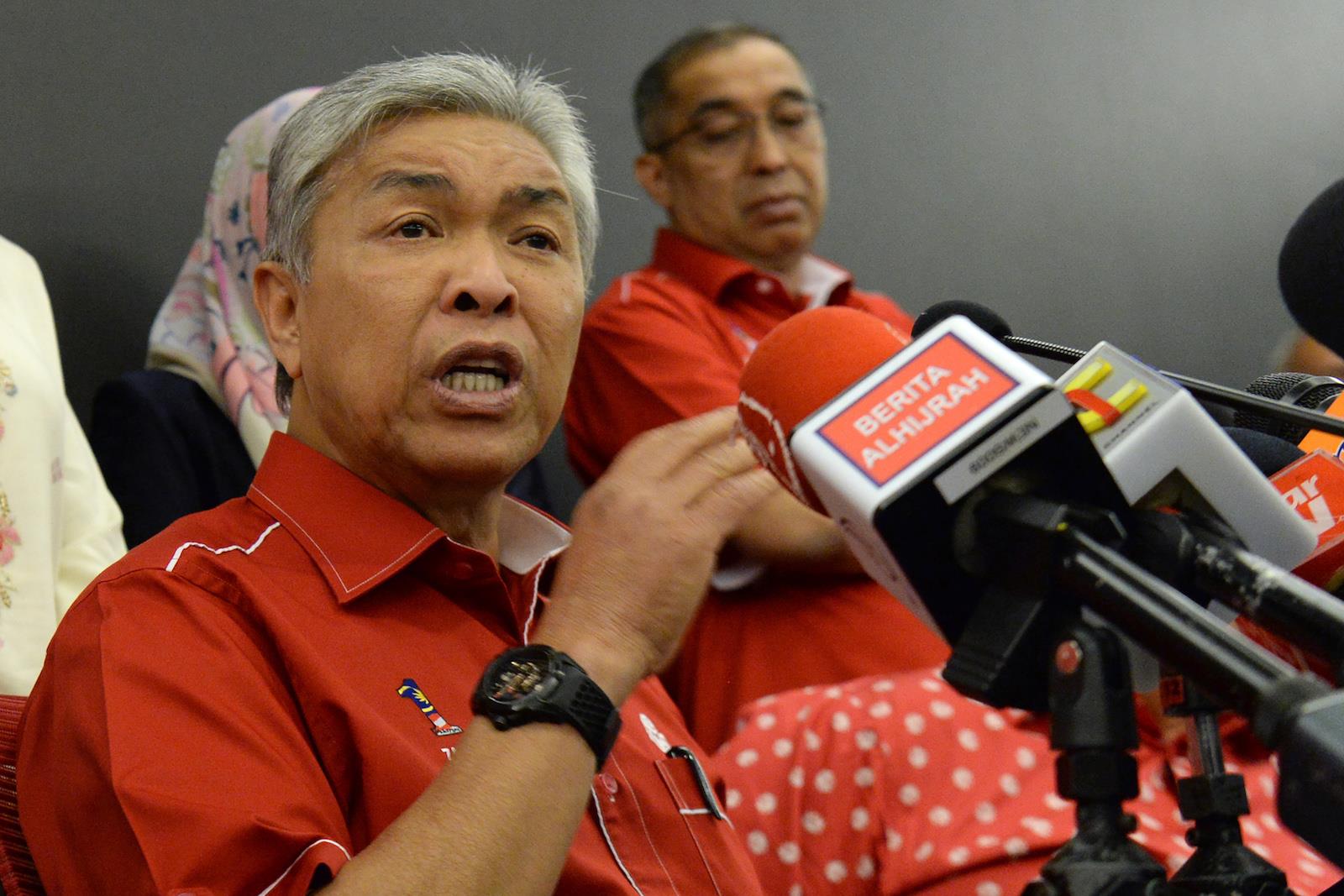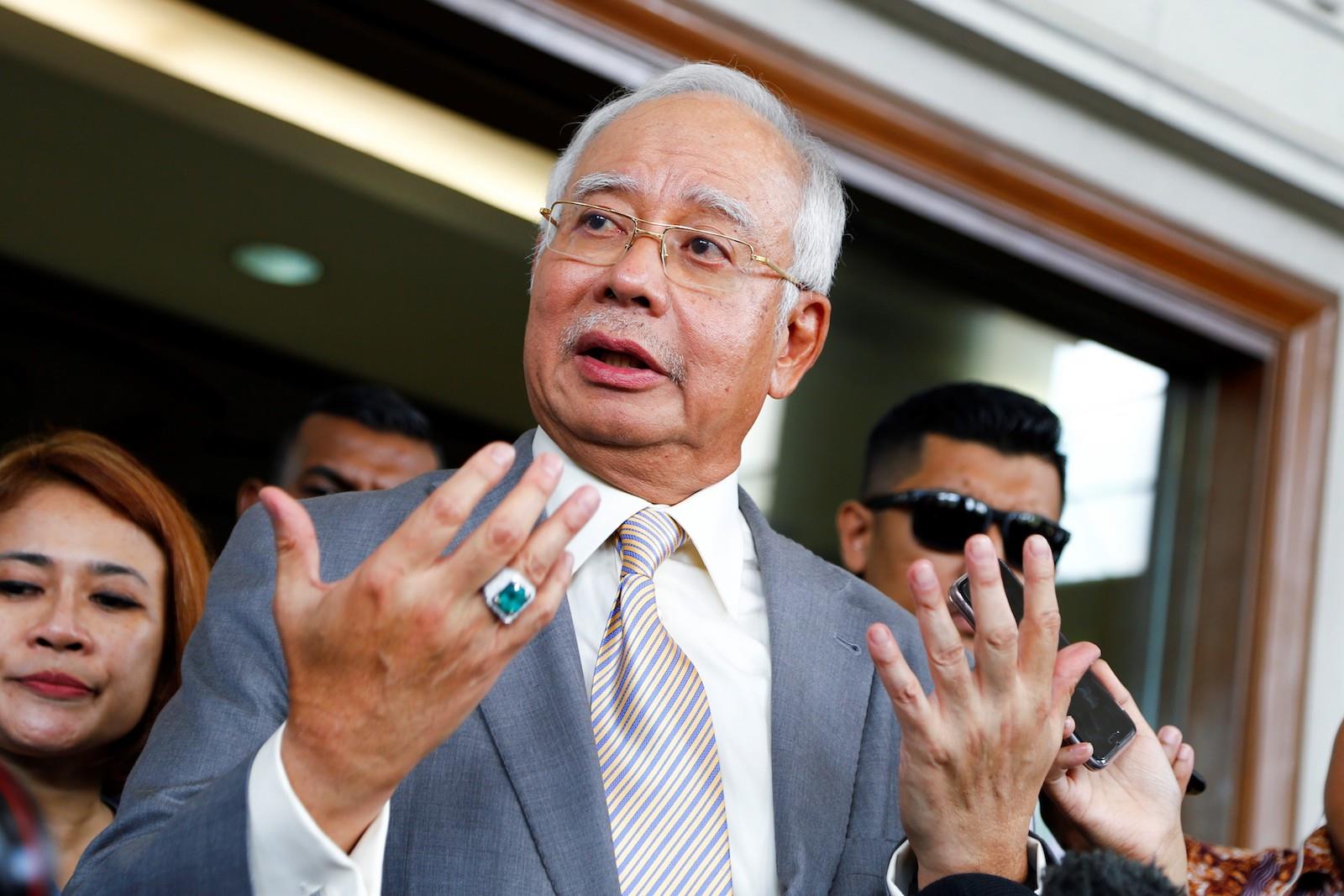(MENAFN- Asia Times) SINGAPORE – Amid a deepening political quagmire, Malaysian Prime Minister Muhyiddin Yassin is defying calls for his resignation while maintaining that his embattled government still commands a parliamentary majority following a bold bid to unseat him by leaders of the United Malays National Organization (UMNO), the ruling coalition's largest party.
Flanked by 11 UMNO lawmakers, UMNO president Ahmad Zahid Hamidi claimed on Tuesday (August 3) he had a sufficient number of statutory declarations from legislators who were withdrawing their support for Muhyiddin, asserting at a press conference that the premier had lost his governing majority and should resign.
It wasn't the first time that Zahid had made such an assertion. On July 8, he declared UMNO had withdrawn its support for Muhyiddin, but UMNO ministers serving in Cabinet stayed on, refusing to toe the party line. At least one minister has so far resigned following Zahid's latest directive, and speculation is rife that further defections may follow.
Unprecedented tensions between the government and Malaysia's constitutional monarch, cited by Zahid as one of the factors behind his latest push to topple Muhyiddin, has given the premier's opponents fresh impetus to bring down his wobbly administration amid talk of the country being on the cusp of a major constitutional crisis.
On July 29, Malaysia's king strongly censured the government for attempting to bypass Parliament to revoke ordinances passed during a seven-month nationwide state of emergency that expired on August 1, accusing the administration of“misleading” lawmakers when the proposed annulment of the measures had, in fact, not received royal assent.
King Sultan Abdullah Sultan Ahmad Shah also said the government assured him that the ordinances would be debated and voted on in Parliament, as required by the constitution unless the palace consents to their revocation. Muhyiddin responded defiantly by insisting that his government had acted in accordance with the law.
A statement issued by the prime minister's office said the Cabinet had advised the king to revoke the ordinances prior to last week's special sitting of Parliament and that the monarch, who is known as Yang di-Pertuan Agong, was required to act on that advice as per the constitution, pointing to conflicting legal interpretations of the king's role.

Malaysia's King Sultan Abdullah Sultan Ahmad Shah has taken issue with the government. Photo: AFP / Nazri Rapaai
“A question arises as to whether the king is merely playing a rubber-stamp role, or his assent to revoke the emergency ordinances is a necessary, constitutional step? The prime minister's office seems to think the former, but the palace thinks otherwise,” noted parliamentary affairs observer and researcher Ong Ooi Heng in a media report.
Had Muhyiddin followed the king's advice and tabled the ordinances for a vote in Parliament, which sat last week for the first time since emergency rule was declared in January, observers say the measures could have been voted down, a political slap in the face that would have been construed as a vote of no confidence.
The ordinance debacle overshadowed parliamentary proceedings, which began last Monday (July 26) and were slated to be held over five days. But the sitting was suspended after just four days after a mass Covid-19 screening detected 11 positive cases, forcing the legislature into a lockdown amid political uncertainty following the king's royal reprimand.
Defiant opposition lawmakers attempted to march on the Parliament building on Monday (August 2) to protest the deferred sitting, which they said was politically motivated, and demand Muhyiddin's resignation, but were turned away by riot police who blocked roads to the premises with heavy barricades in a dramatic show of force.
“Muhyiddin as prime minister has fallen today,” declared opposition leader Anwar Ibrahim in remarks to the media, citing the opposition's count of 107 legislators and claims that lawmakers from other parties wanted to pull out of the ruling Perikatan Nasional (PN) government in an apparent foreshadowing of Zahid's announcement.
In a bid to pre-empt the UMNO president's directive, Muhyiddin reversed course on August 3, declaring in an about-face that his government was ready to follow the king's suggestion that the revocation of emergency ordinances be debated in Parliament, vowing to debate the measures in the House at the next scheduled sitting in September.
Muhyiddin responded to Zahid's claims in a televised address on Wednesday (August 4), stating that he was confident he commands a parliamentary majority after obtaining statutory declarations from lawmakers pledging their support for him and promising to test his numbers in a confidence motion when the legislature convenes next month.

Ahmad Zahid Hamidi during a press conference in Kuala Lumpur on May 14, 2018. Photo: AFP / Roslan Rahman
“I am aware that my position as prime minister always gets questioned. Therefore, I have informed the king that I will prove my legitimacy as prime minister in the Parliament. A motion of confidence will be tabled when the Parliament meets in September,” said Muhyiddin following discussions with the monarch that took place earlier in the day.
A joint statement issued by the opposition Pakatan Harapan (PH) coalition and other opposition lawmakers disputed Muhyiddin's claim, saying it was numerically“impossible” for him to maintain an intact majority given that government backbenchers from UMNO publicly withdrew their support for his administration.
To command a simple majority, Muhyiddin would need at least 111 votes among the Parliament's current 220 members. With 105 lawmakers on opposition benches, two independents, and at least 11 defectors from UMNO, the premier may have only 82 votes, though his lack of a majority does not necessarily equate to a majority for his opponents.
Opposition legislators are demanding another special sitting of Parliament to be held no later than August 9 to debate and vote on a motion of confidence in the government, arguing that it would be unfair for the government to delay the sitting until September when Muhyiddin's current standing as prime minister is in doubt.
Muhyiddin stated that the king had accepted his suggestion of tabling a confidence motion in September. Standing beside Muhyiddin as he spoke was Deputy Prime Minister Ismail Sabri Yaakob, who leads an UMNO faction that has worked to prop up the PN government amid maneuvers by Zahid and former premier Najib Razak to topple it.
Ismail, who is also defense minister, was reported by local media to have attended a secret meeting of lawmakers held at a defense ministry premises in Kuala Lumpur on Monday, where a group of 30 legislators with the UMNO-led Barisan Nasional (BN) coalition were gathered to sign statutory declarations in anticipation of Zahid's announcement.
During his televised address, Muhyiddin took aim at the UMNO faction led by Zahid and Najib. Without directly naming them, he said critics in the party opposed him because he refused to accede to their demands to“interfere in court matters to free several individuals who are being charged over criminal acts.”
Zahid is on trial facing criminal charges involving money laundering, abuse of power and other offenses, while Najib has already been found guilty of corruption and abuse of power, and was sentenced to 12 years in jail last July. He is appealing the verdict. Two others among the 11 opposing Muhyiddin also face criminal trials.

Former Malaysian Prime Minister Najib Razak talks to media at Kuala Lumpur's High Court after a hearing in the 1MDB financial fraud case on October 25, 2018. Photo: AFP via Andalou Agency / Adli Ghazali
Muhyiddin's most recent test of parliamentary support was in December when a narrow majority of lawmakers approved his 2021 budget in a 111-108 vote. Political analysts say the premier is attempting to buy time to reverse recent UMNO defections and recruit party-hoppers among the opposition to survive the confidence vote in September.
Wong Chin Huat, a political scientist at the Jeffrey Sachs Center on Sustainable Development, said criminally-accused UMNO leaders and others who have“gone all out” against the premier“would not allow Muhyiddin his sweet time of a month to build back a coalition and let themselves be condemned to the political wilderness.”
Others believe Ismail, who was appointed as deputy premier last month in a snub to Zahid, could be installed as an interim premier if Muhyiddin exhausts his options and is forced to resign, a scenario that is not guaranteed to ease tensions between UMNO's warring factions but one that its anti-Muhyiddin camp would find broadly preferable to the status quo.
In a statement on Wednesday, Zahid said he submitted an expanded list of party lawmakers who have lost confidence in Muhyiddin to the Istana Negara, or national palace, but did not specify a number or provide names. Local media have reported that up to 14 UMNO legislators, according to party sources, have retracted their support for the government.
“Expect to see more UMNO parliamentarians leave. With every individual minister or deputy minister leaving the government, those who stay back with Muhyiddin will face tremendous pressure from party grassroots. If the number snowballs, they will also demand the vote of no-confidence next week instead of next month,” Wong told Asia Times.
“If this is backed in any way by the Malay Rulers, Muhyiddin may just have to cave in,” Wong surmised.“If he cannot reverse the loss of majority, his number is going to shrink to two digits in the days ahead. However, if an alternative majority fails to emerge, the power struggle may drag on. Muhyiddin may stay on or strive to stay on as a minority PM.”
One of Muhyiddin's key advantages, say political observers, is the disunity among his opponents, who have been unable to coalesce around a figure capable of securing a majority to replace him. Allies of the premier have already floated the formation of a minority government as an option for the king to consider.
Ahmad Faizal Azumu, deputy president of Muhyiddin's Parti Pribumi Bersatu Malaysia (Bersatu) party, said that the king could contemplate such an option“if Muhyiddin still has the highest number of lawmakers (supporting him) but is short of a majority,” while condemning Zahid for triggering“political instability” amid the nation's health crisis.

A Malaysian man waves a white flag at his flat in Puchong in a call for help amid the Covid-19 pandemic, June 29, 2021. Image: Twitter/The Star/Azhar Mahfof
Against a backdrop of ceaseless political dysfunction, Covid-19 cases in Malaysia remain stubbornly high despite strict lockdown measures that have remained in force since June. Daily infections hit another all-time high on Wednesday, with 19,819 cases recorded. Active cases exceeded 200,000 for the first time this week, more than tripling since July 1.
Oh Ei Sun, a senior fellow at the Singapore Institute of International Affairs, said he was doubtful whether Muhyiddin would keep his promise of holding a parliamentary sitting at the end of September given his“political track record of using the pandemic and surging case numbers to repeatedly delay parliamentary sittings.”
“If we look at this pattern of recalcitrant, wilful breaches of constitutional precedents and protocols and so on, it is very doubtful whether a motion of confidence will actually be introduced,” opined the analyst.“His words are next to politically worthless nowadays because his credibility and that of his government are at a nadir.”
MENAFN04082021000159011032ID1102566910